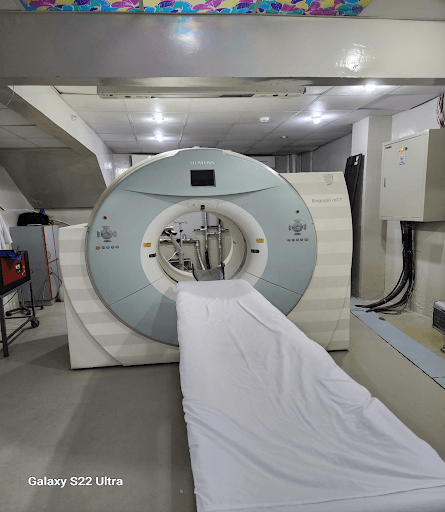Nuclear Medicine & Molecular Imaging

64-SLICE SIEMENS PET-CT WITH SELF SHIELDED CYCLOTRON
NCCI has always been at the forefront of providing state of the art services to its patients. Another accomplishment of our institute was the installation of a 64-slice PET-CT Scanner with a self-shielded Cyclotron in 2015.
NCCI was the first private medical institute to have this facility and only the second center in Pakistan. As we have a built in self-shielded cyclotron we are self-sufficient in FDG production and are able to provide better image resolution due to the scanner configurations.
Positron Emission Tomography, also called PET imaging or a PET scan, is a diagnostic examination that involves getting images of the body based on the detection of radiation from the emission of positrons. Positrons are tiny particles emitted from a radioactive substance administered to the patient.
Advantages of a PET/CT Scan
With PET/CT, your treating physicians can make more accurate diagnoses, develop more targeted treatment plans, and do better, less-invasive treatment monitoring, which should result in improved patient outcomes. Along with providing better imaging data, it notably increases patient comfort and convenience by reducing the number of scanning sessions a patient must undergo.
Patient Safety Tips Prior to the Exam
- Please let us know if you have any allergies or adverse reactions to medications.
- If you are pregnant or may be pregnant, please tell your doctor or technologist.
- Please leave your valuables at home or in your room in the hospital.
- Bring a list of your current medications with you (out-patient).
Preparation for the Procedure
- You will be asked to follow the Limited Carbohydrate diet for the previous 24 hours before the date of your appointment.
- Prepare a list, which includes:
- Names of medications you are currently taking
- Brief medical history
- Treatments you have had (chemotherapy, radiation therapy, surgery)
- Do not eat for at least 4–6 hours prior: We recommend that you have nothing to eat for at least 4–6 hours prior to your test (except water and your usual medications).
- Drink water: You are encouraged to drink 3–4 glasses of water prior to arriving at NCCI.
- Do not take your diabetic medication the morning of the test. You may take all other medications as usual.
- Arrive 15-30 minutes before your PET scan
During the Exam
- The PET-CT staff will verify your identification and exam requested.
- The PET/CT staff will take a small blood sugar sample and place a small intravenous line (IV) for a simple injection of the radioactive tracer called FDG. The radiologist may also want to have some contrast injected with the FDG through the same IV line. The blood test, tracer and contrast injection are necessary components of this study.
- Following the injection, you will be asked to sit quietly for 45-60 minutes.
- You will then be imaged on the PET/CT scanner for approximately 30-40 minutes.
- If you have any questions you can ask our staff or the technologist at any time before, during and after the procedure.
After the Procedure
- You should drink about 5 glasses of water.
- Nursing mothers should wait for 24 hours before resuming breast-feeding.
- Usually there are no side effects of the FDG or the contrast but in case you feel any symptoms such as nasal congestion, itchy eyes, rashes, sneezing, tremors, nausea, vomiting, dizziness, please notify the staff immediately. If you experience these at home after the procedure please contact your doctor or go to the nearest hospital.
Report of Your Scan
- Usually the reporting time for all PET-CT examinations is over a period of 2 days, but provisions for earlier reporting dispatch can be made in certain cases. If you need the report urgently please contact the PET-CT reception for further information.
The PET-CT Reporting Team at NCCI
This includes well known consultant nuclear physician and a consultant radiologist with a vast experience in molecular imaging interpretations. The following are the consultants who will be interpreting your scans;
- Professor Shahid Kamal, MBBS, MS (UK), PhD
Consultant Nuclear Physician and Chair Department of Molecular Imaging, NCCI
- Dr. Mahesh Kumar, MBBS, FCPS, EDiR
Consultant Radiologis
